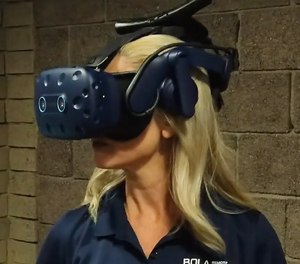
Training sessions in VR teach inmates coping skills before they’re released
Reintegrating into society can be a major challenge for inmates after their release, particularly for those with poor social skills. Not knowing how to deal constructively with interpersonal conflicts and people, in general, can lead to negative outcomes that, in the worst cases, can land inmates back in jail. This can be particularly true in family situations, where a lack of coping skills can make interactions emotionally toxic for released incarcerated individuals, their spouses, and children alike.
One way of improving inmates’ chances for successful reintegration is to train them in life/social skills, conflict resolution, and improved decision-making prior to release. Doing this by having inmates wear immersive virtual reality (VR) headsets allows them to learn using real-life 360-degree training scenarios. In VR training, the inmates get to "interact" with 2D/3D characters in all kinds of social situations, including those that are emotionally challenging.
The inmates’ responses during these VR sessions direct them to positive or negative outcomes, based on the decisions the inmates make. When the outcomes are negative, trainers can help inmates do better next time by offering useful ways to respond differently to the situations. The inmates can then repeat the VR scenarios as many times as needed until they achieve the desired outcome.
This VR-based training approach is being offered through WRAP Reality from WRAP Technologies and is now being implemented in corrections institutions by the Pennsylvania Department of Corrections (Penn DOC).
Using part of a $680,000 grant from the U.S. Office of Juvenile Justice and Delinquency Prevention programs to buy the WRAP Reality platform and Oculus VR headsets – which have been distributed between participating facilities – Penn DOC is working with WRAP Technologies in a VR training pilot program that enhances positive interactions among inmates and their families.
This pilot program has two elements:
TJ Kennedy is CEO of WRAP Technologies . It is the company’s WRAP Reality VR training platform that is at the heart of the Penn DOC pilot program.
“WRAP Reality is our VR training platform for law enforcement, corrections and societal reentry,” Kennedy told Corrections1. “It comes with VR headsets, sensors to detect the wearer’s position in 3D space, 3D VR animated training scenarios and platform, and a computer where a trainer can assist the student with virtual scenarios and decision paths.”
All kinds of positive family interactions can be programmed and taught using VR, while negative outcomes can be experienced by the student without actual consequences.
“We cover situations such as dealing with family conflicts constructively, plus basic yet often challenging tasks like setting and adhering to appropriate bedtimes for children,” Kennedy said. “Maybe success lies in reading them a story before bed, just sitting with them, and/or setting the same time every day and sticking to it. Whatever the case, for incarcerated individuals and other parents who may have not experienced such things in their own lives, being able to try new ways of interactions and then achieving positive results can be a real eye-opener.”
This same kind of VR training is used by WRAP Technologies to help inmates cope with other post-release situations, from knowing how to navigate in a modern supermarket to using a smartphone.
“If you were incarcerated prior to 2007, you may have no idea what an iPhone looks like or any modern smartphone for that matter,” Kennedy said. “Maybe the last device you worked with was a flip phone or something of that nature, and now you’re expected to use a smartphone and cope?”
Well, through VR training, inmates can do just that prior to release. They can learn all about using smartphones in VR without the security risks associated with providing inmates access to these devices, and they can be ready to use the real thing once they get outside.
Best of all, VR training (aka v-learning) works. According to research conducted by Pricewaterhouse Coopers , “V-learners completed training 4 times faster than classroom training. V-learners (also) felt 3.75 times more emotionally connected to the content than classroom learners.”
NEXT: Reducing recidivism through corrections and workforce partnerships
Copyright © 2025 CorrectionsOneGrants.com. All rights reserved.
